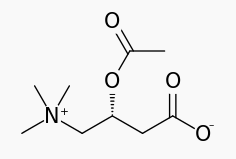Acetylcarnitine
 | |
| Clinical data | |
|---|---|
| ATC code | |
| Identifiers | |
| |
| CAS Number | |
| PubChem CID | |
| E number | {{#property:P628}} |
| ECHA InfoCard | {{#property:P2566}}Lua error in Module:EditAtWikidata at line 36: attempt to index field 'wikibase' (a nil value). |
| Chemical and physical data | |
| Formula | C9H17NO4 |
| Molar mass | 203.236 |
Acetyl-L-carnitine or ALCAR, is an acetylated form of L-carnitine. ALCAR has been claimed to be superior to normal L-carnitine in terms of bioavailability. However, at least one study has suggested that the acetylated form may have a lower oral bioavailability.[1]
It is claimed that ALCAR provides several benefits. Advocates of acetyl-L-carnitine market it as a life extension supplement. There may be some benefit in cases of end stage renal disease or peripheral arterial disease.[2] When supplemented alongside Lipoic acid, ALCAR appears to reverse some of the damage to mitochondria associated with aging.[3]
The percentage of L-carnitine that is absorbed when taken via oral supplementation is much lower than that from food sources. In one particular study, it was shown that approximately 20% of orally supplemented L-carnitine is absorbed, with a bioavailability of roughly 15%, as compared to a bioavailability of between %60 and %75 when absorbed from food.[4]
Choline supplementation may lead to increased L-carnitine retention.[4]
ALCAR supplementation has been shown to be neuroprotective in instances of cerebral ischemia,[5] periphiral nerve injury,[6] and to be beneficial in the treatment of Parkinson's disease in animals.[7]
ALCAR supplementation has also been shown to reverse syptoms associated with mental decline in the eldery.[8]
ALCAR is being researched in the treatment of Alzheimer's disease.[9]
References
- ↑ Eder, K. (2005). "Free and total carnitine concentrations in pig plasma after oral ingestion of various L-carnitine compounds". Int J Vitam Nutr Res. 75 (1): 3–9. Retrieved 2007-3-13. Unknown parameter
|coauthors=ignored (help); Check date values in:|accessdate=(help) - ↑ Brass, Eric P. (1998). "The Role of Carnitine and Carnitine Supplementation During Exercise in Man and in Individuals with Special Needs". Journal of the American College of Nutrition. 17 (3): 207–215. Retrieved 2007-3-13. Unknown parameter
|coauthors=ignored (help); Check date values in:|accessdate=(help) - ↑ Ames, B. N. (2005). "Delaying the mitochondrial decay of aging with acetylcarnitine". Ann N Y Acad Sci. 1033 (1): 108–16. Retrieved 2007-3-13. Unknown parameter
|coauthors=ignored (help); Check date values in:|accessdate=(help) - ↑ 4.0 4.1 "L-Carnitine". PRD Health. Thompson Healthcare. Retrieved 2007-3-13. Check date values in:
|accessdate=(help) - ↑ Zanelli, Santina A. (2005). "Mechanisms of ischemic neuroprotection by acetyl-L-carnitine". Ann N Y Acad Sci. 1053: 153–161. Retrieved 2007-3-14. Unknown parameter
|coauthors=ignored (help); Check date values in:|accessdate=(help) - ↑ Wilsona, Andrew (2007). "Delayed acetyl-l-carnitine administration and its effect on sensory neuronal rescue after peripheral nerve injurystar, open". J Plast Reconstr Aesthet Surg. 60 (2). Retrieved 2007-3-14. Unknown parameter
|coauthors=ignored (help); Check date values in:|accessdate=(help) - ↑ Beal, Flint (2003). "Bioenergetic approaches for neuroprotection in Parkinson's disease". Ann Neurol. 53 (S3): S39–S48. Retrieved 2007-3-14. Check date values in:
|accessdate=(help) - ↑ Salvioli, G (1994). "L-acetylcarnitine treatment of mental decline in the elderly". Drugs Exp Clin Res. 20 (4): 169–76. Retrieved 2007-3-14. Unknown parameter
|coauthors=ignored (help); Check date values in:|accessdate=(help) - ↑ Hafiz, Mohmmad Abdul (2006). "Acetyl-L-carnitine-induced up-regulation of heat shock proteins protects cortical neurons against amyloid-beta peptide 1-42-mediated oxidative stress and neurotoxicity: Implications for Alzheimer's disease". J Neurosci Res. 84 (2): 398–408. Retrieved 2007-3-14. Unknown parameter
|coauthors=ignored (help); Check date values in:|accessdate=(help)
Other reviews
- Template:Pauling
- "Carnitine (L-carnitine)", University of Maryland Medical Center
Template:Psychostimulants, agents used for ADHD and nootropics
- Pages with script errors
- Pages with citations using unsupported parameters
- CS1 errors: dates
- E number from Wikidata
- ECHA InfoCard ID from Wikidata
- Chemical articles with unknown parameter in Infobox drug
- Articles without EBI source
- Chemical pages without ChemSpiderID
- Chemical pages without DrugBank identifier
- Articles without KEGG source
- Articles without InChI source
- Articles without UNII source
- Drugs with no legal status
- Articles containing unverified chemical infoboxes
- Dietary supplements
- Quaternary ammonium compounds